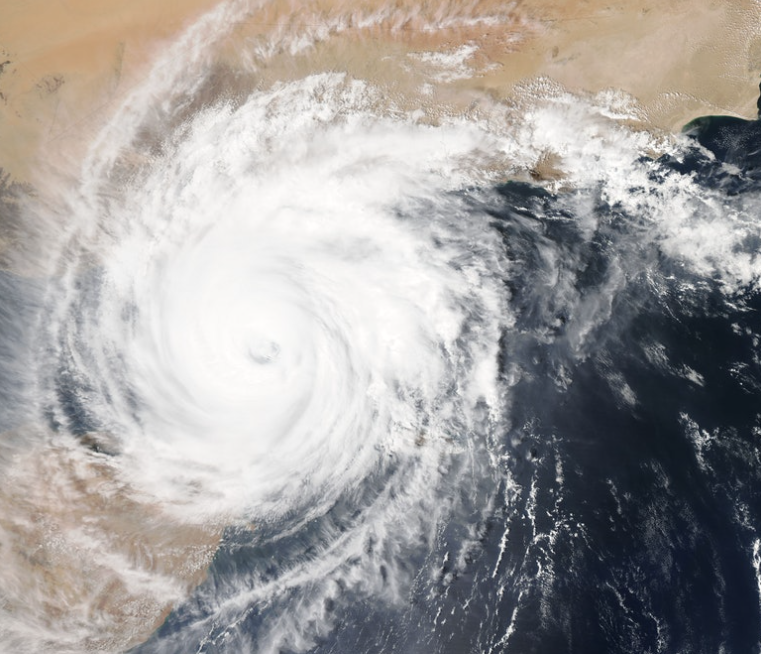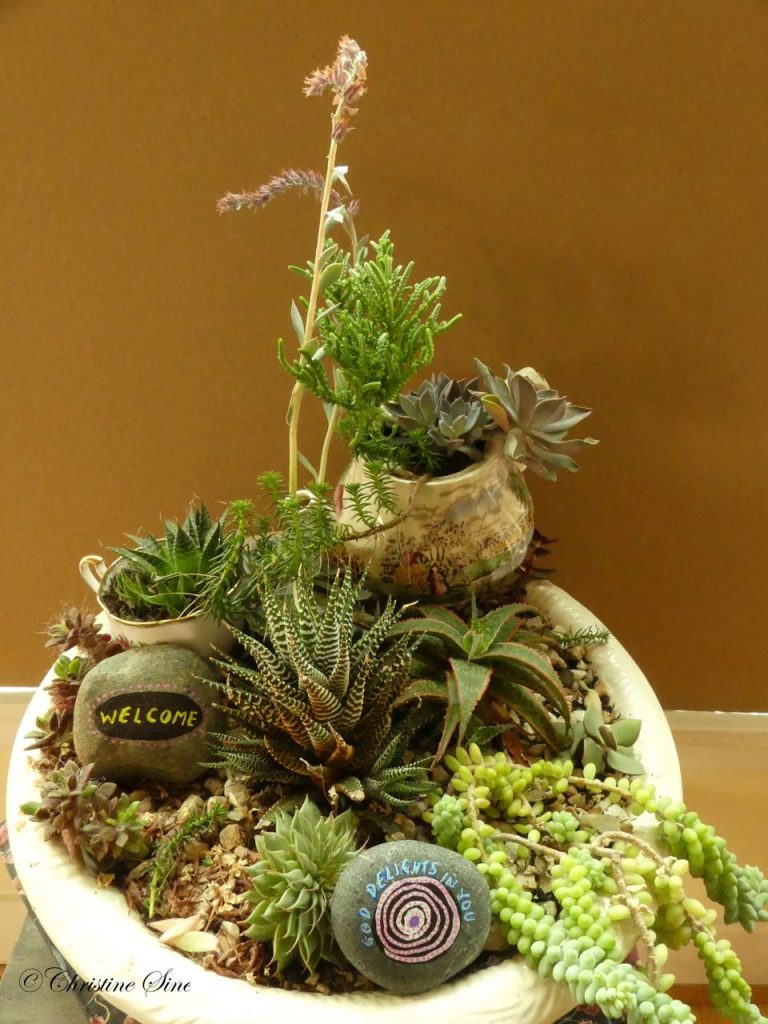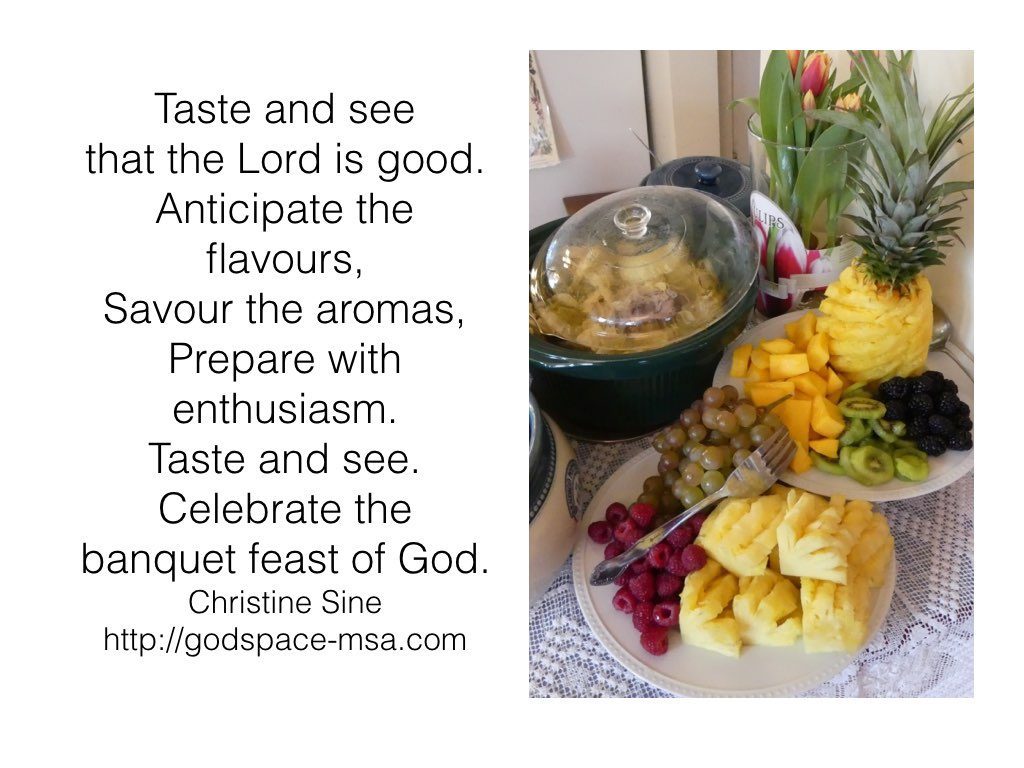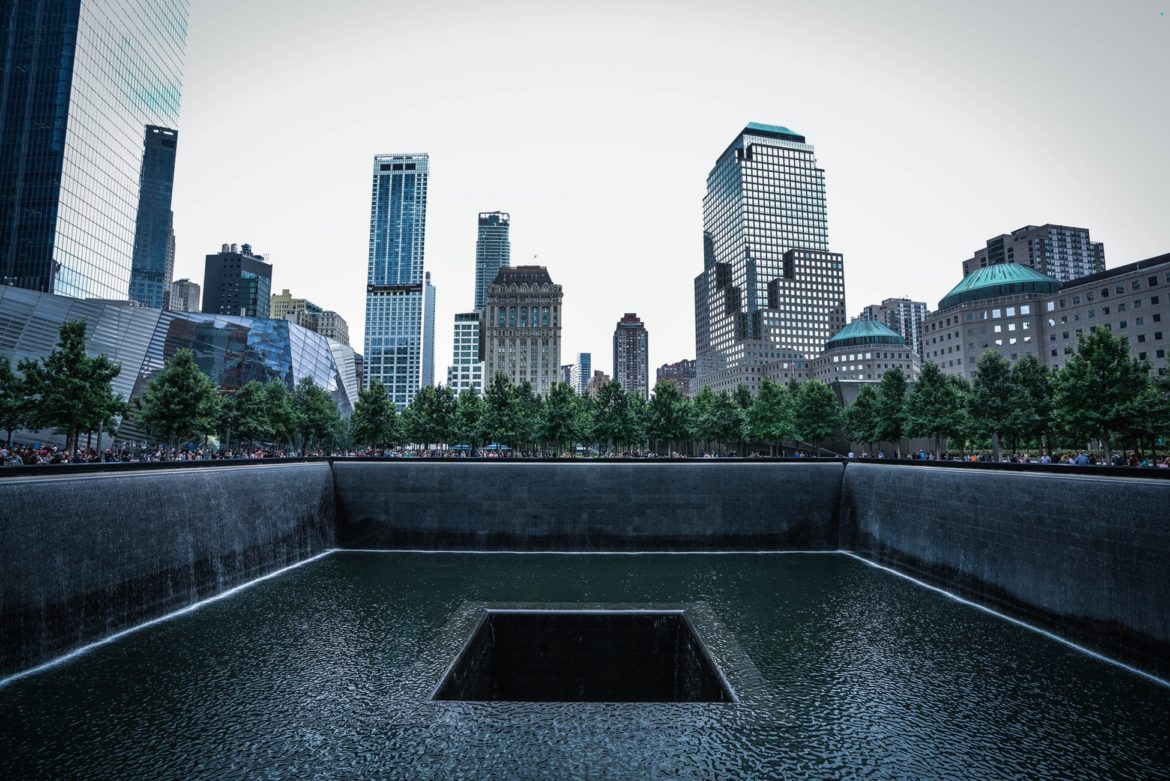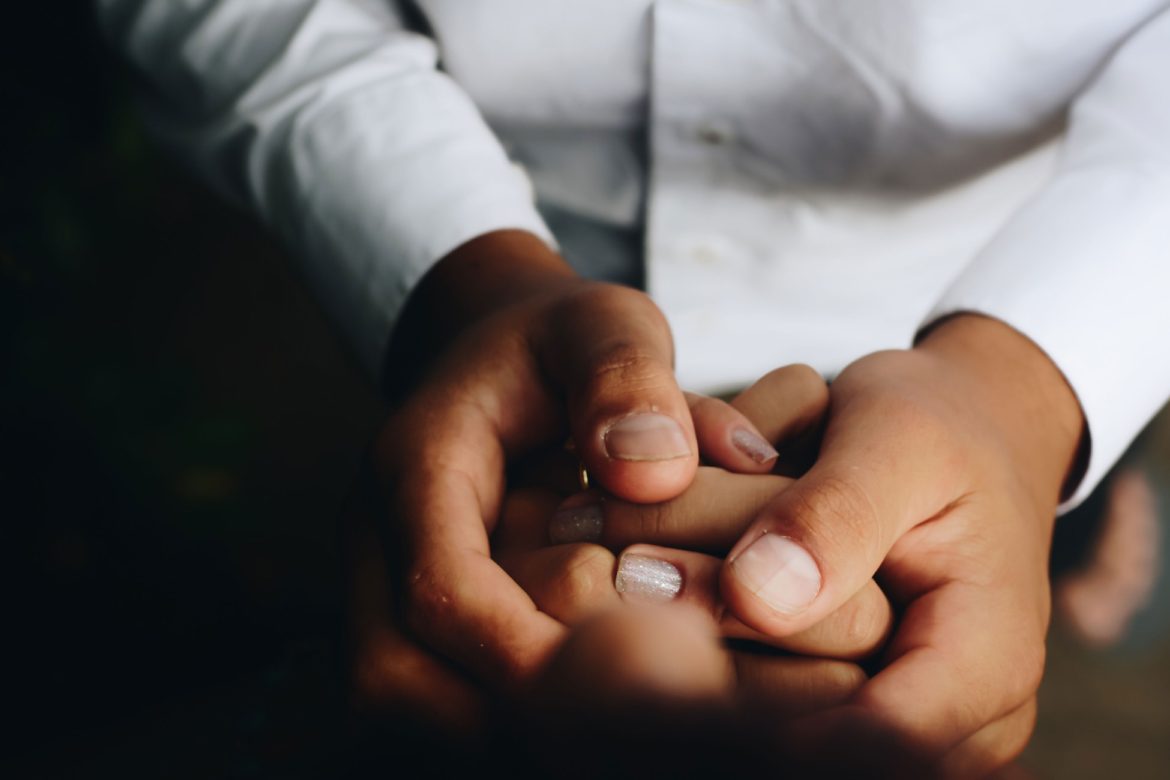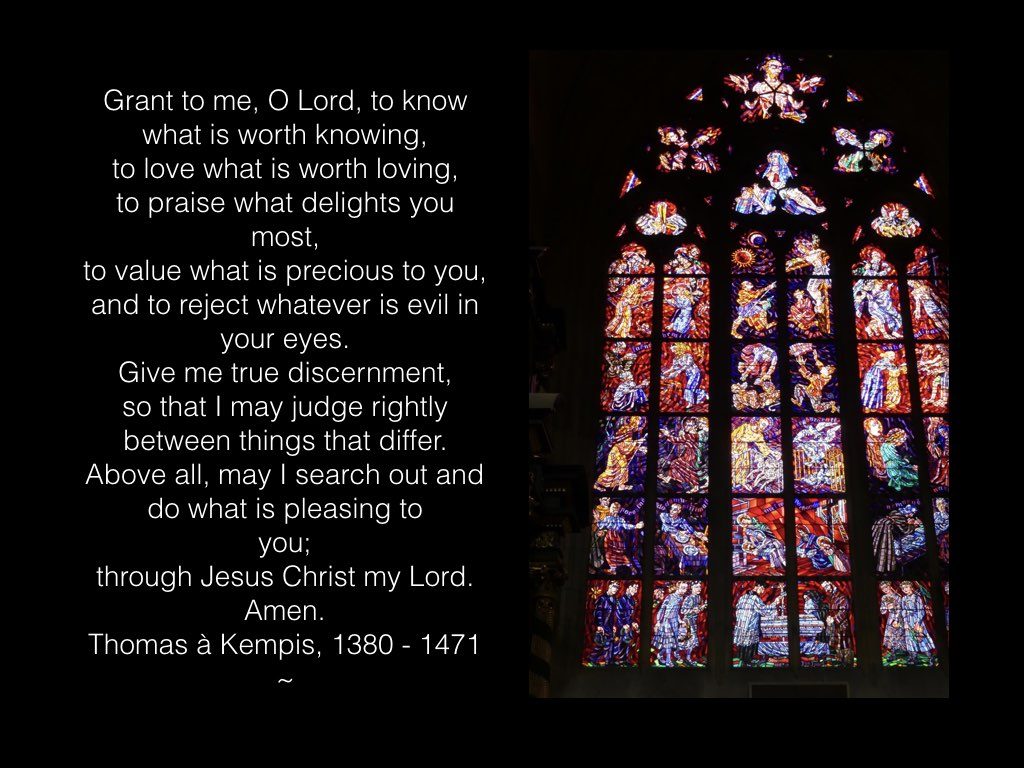By Tom Sine — this was first published on V3 blog.
CHURCHES REACHING OUT TO NEIGHBORS IN CRISIS IN TEXAS AND FLORIDA
Recently Rev. Walter August Jr. let service out early so Bethel’s Family Church in Texas so members could take food and supplies to help neighbors hammered by Hurricane Harvey. Bethel is only one of a number of churches in Texas reaching out to their neighbors.
The week after Harvey struck pastor August retired to his office to marry Eric Lark and Toni Lee. As he completed the paper work, he asked about their plans. ‘We are going to change our clothes and we are going to serve.’ The bride replied I have an S.U.V. so I am coming around to pick up supplies.
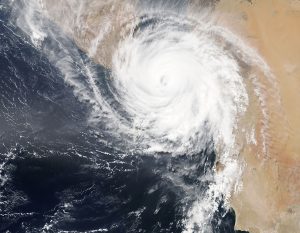 The latest report is that Hurricane Harvey has taken 30 lives. Over 40,000 homes have been destroyed. At least a half million cars have been destroyed as well. It is important to remember that while Harvey hammered Texas monsoons where devastating huge regions in India, Pakistan and Bangladesh. Mexico has also suffered a daunting earthquake.
The latest report is that Hurricane Harvey has taken 30 lives. Over 40,000 homes have been destroyed. At least a half million cars have been destroyed as well. It is important to remember that while Harvey hammered Texas monsoons where devastating huge regions in India, Pakistan and Bangladesh. Mexico has also suffered a daunting earthquake.
Now “Monster Irma” has brought death and destruction to thousands of families in the Caribbean. There has been enormous flooding and devastation of homes and property as Irma traveled north through Florida. 50,000 people were in shelters and five million people are without power. There has been massive destruction of infrastructure and there are no reports of how many lives have been lost and Hurricane Jose is on its way. Recovery will take years for these two regions and families who live there to recover.
FEMA, the agencies in Florida, the Red Cross, The Salvation Army and thousands of churches are among the first responders to the most devastating hurricane ever seen in the Unites States. All of us need to join the people in Florida, Texas and people living in countries in the Caribbean with our prayers, and our contributions but there are also opportunities to volunteer with organizations like the Red Cross.
HOW CAN NEW CHURCHES OLD AND NEW PREPARE FOR NEW CRISES WHERE YOU LIVE?
After Katrina denominations like the Southern Baptists and United Methodists developed sophisticated disaster preparedness strategies in cooperation with local disaster groups. Now there are church leaders in this large response in Texas and in Florida.
Wouldn’t, it be a good idea for all congregations, including new plants, to join them in preparing for the next crisis that will impact your lives and community? I do realize that new church plants often have very limited resources to create this kind of preparedness. You might begin like the Mustard Seed Church in Austin Texas did. They joined a group called Ecclesia Houston in becoming first responders in Austin.
Or consider beginning like Axiom Church in Syracuse. They offer a discipleship course to develop a rule of life and rythmn of life. This enables members to free up more time and resources to not only be more present to God but also to become first responders to reach out to neighbors.
HOW CAN ALL OF US AND OUR CHURCHES PREPARE FOR THE NEXT CRISIS WHERE YOU LIVE?
Let me share what Christine and I have done to prepare in both our home and with church leaders in
Seattle, for example, is overdue for a major earthquake. We prepared by cross bracing our foundations to add stability. We also prepared by purchasing earthquake insurance.
We also met with 50 Christian leaders In Seattle 2007 because I suspected we were headed for a major economic recession. Though many of these leaders were skeptical that a recession was heading our way they came up with some innovative ideas. For example, one idea was to create a church “Craig’s List” researching their congregations to make an online list of those who have an extra room in their homes or cars they could share.
After this idea-storming session, two churches actually offered courses they had imagined., as the recession became more threatening. A Lutheran church offered a course on how to help families prepare by getting their finances in orders. A Baptist congregation offered a course where older members taught younger members how to can vegetables and fruit from their gardens for tougher times.
HOW CAN YOU ENABLE YOUR PEOPLE TO PREPARE NOW FOR THE NEXT CRISIS?
- How can you enable families and individuals to create economic, food water and medical reserves for the next local crisis? Check out the Covenant Church model communitycovenant.net/emergency-mission-partners-help-community-prepare-together..
- How can your congregation, like the Mormons, also store food, water and medical supplies not only for your members but for your neighbors as well?
- How can your church develop a disaster preparedness plan? How can a new church plant take first step, in partnership with established churches, to develop a beginning plan? I find the Southern Baptist plan particularly helpful. https://www.namb.net/send-relief/disaster-relief
- How can your church also join those moving from disaster relief to rebuilding with sustainable housing. After Katrina a number of churches and Christian organizations joined in building new forms of sustainable housing. This includes everything from constructing more resilient “Tiny Katrina Houses” to joining Habitat for Humanity in building more sustainable housing for those whose homes were destroyed in Texas and Florida. https://www.habitat.org/impact/our-work/disaster-response Could you or your church consider joining the huge opportunity to construct sustainable housing for the hundreds of families who have lost their homes?
- Consider joining Christians in Britain, Australia and Canada, in working for creation care to decrease global warming to reduce the frequency and power of natural disasters… not only for people today but for the future of your kids and grand kids. Check out: Evangelical Environmental Network: creationcare.org/ Also Watershed Discipleship: https://watersheddiscipleship.org/
Don’t miss the opportunity to join those who are creating new ways to be the compassion of Jesus in theses increasingly turbulent times!
PLEASE WRITE US AND TELL US WHAT YOU AND YOUR CHURCH ARE DOING TO GET READY FOR “CRISIS NEXT“ SO WE CAN SHARE WITH OTHERS. twsine@gmail.com
by Christine Sine
It has been a hard week for many of us. Even those of us who do not live in the path of the hurricanes, monsoons or earthquakes have been glued to the T.V. screen. It’s stressful, makes us anxious and disturbs our equilibrium. How do we regain our calm center at a time like this. A couple of months ago I wrote this post 10 Tips For Resting Through the Day which spells out some of the practices I have found helpful, but this week I find myself reaching into my creative center to sustain me.
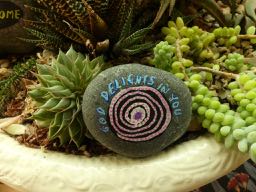
I put together a new contemplative garden made from recycled materials and imperfect painting as a reminder of the imperfections in my own life as well as in the world around me. I am heartened by God’s ability to bring renewal in the midst of all things.
- I am recycling containers for my garden and started at our local Good Will Thrift store to look for glass jars and dishes. This was inspired by my friend Pam Pott in England who uses recycled glass to create art. She takes the call to bring renewal and transformation to all creation seriously and sees this as one expression of that.
- I am recycling plants. I love the way my succulents send out babies at this time of year and watch some of them daily to see what is developing.
- I am recycling rocks. I am using a rock from the garden that I first painted on last year. I have painted a background to cover the original design and have restored and renewed it for another season
- I am highlighting my imperfections. I hesitated to share this design with you because I see so many perfectly painted rocks on Pinterest that my own efforts seem very inferior. But as I thought about this today I was reminded of the Japanese art of Kitsugi which makes art by mending broken crockery with gold resin. It reminds me that all of us are broken imperfect people and allowing those imperfections to hang out can be life giving to both us and to others.
- I am relishing the fact that God delights in me. To counteract the draining messages of death and destruction and the confusion it brings to my view of our loving God, I wrote God delights in me prominently around the design. I look at the words frequently through the day and recite them to myself. Sometimes I pick up the rock and hold it in my hand. It fits perfectly. It comforts me.I also wrote out Psalm 147:11 the Lord delights in those who fear him, who put their hope in his unfailing love. in my journal and have been using my gel pens to emphasize my awareness of God’s delight. It reminds me that God is my rock, my fortress, my deliverer. No matter how strong the storms God is always with me, not punishing but delighting in me.
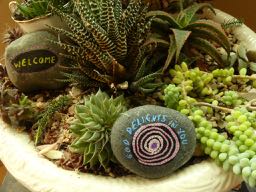
What Is Your Response?
What is one way that you destress and center yourself afresh on God? Set aside time today for that centering activity.
Watch this powerful video and take a few minutes to relax in the knowledge that God our rock is always our refuge and our salvation.
By Talitha Fraser —
God, did you see the news today?
We’re killing one another.
We’re killing in places killing has gone on so long we don’t know how to stop…
We’re killing next door.
We’re killing one another.
God, did you see the news today?
We’re laying waste to the world
to consume, consume, consume
an appetite “stuff” cannot sate.
Our elders know. Our elders tell us.
We ignore their wisdom.
God, did you see the news today?
People are saying hateful, hurtful things
what is right, what is wrong
what is holy, what is profane
…as if we know. As if we could know.
God, did you see the news today?
Were you there when we turned the boats away?
We are denying people food, electricity, sanitation, shelter, medical care…
We are denying people their basic human rights.
People are grieved and weary.
Longing for a world that is different
but not knowing where to start.
Not knowing how to start.
All victims, variously blind.
I’m not pointing fingers, I’m raising my hand.
I need Your help. We need Your help.
Amen
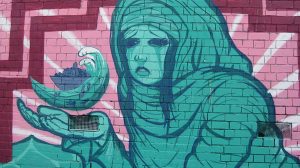
by Christine Sine
I love this season of the year. The tomatoes and squash are ripening, the figs and pears have been harvested and we are about to harvest our apples. The flavours of fruit and vegetables fresh from the garden are a delight. Food as God intended it to be. Some of you may remember this prayer which I wrote last year at this season and the reflection I wrote on savouring the flavour of God which I am reminded of again as I process the abundance.
Part of what I love is the joy of creating new recipes to cope with the overflowing abundance. As I savour the new flavours I can imagine God standing beside me relishing them with me.
Here is a salad I made this weekend that the flavours of still seem to linger in my mouth. I thought some of you would enjoy it too.
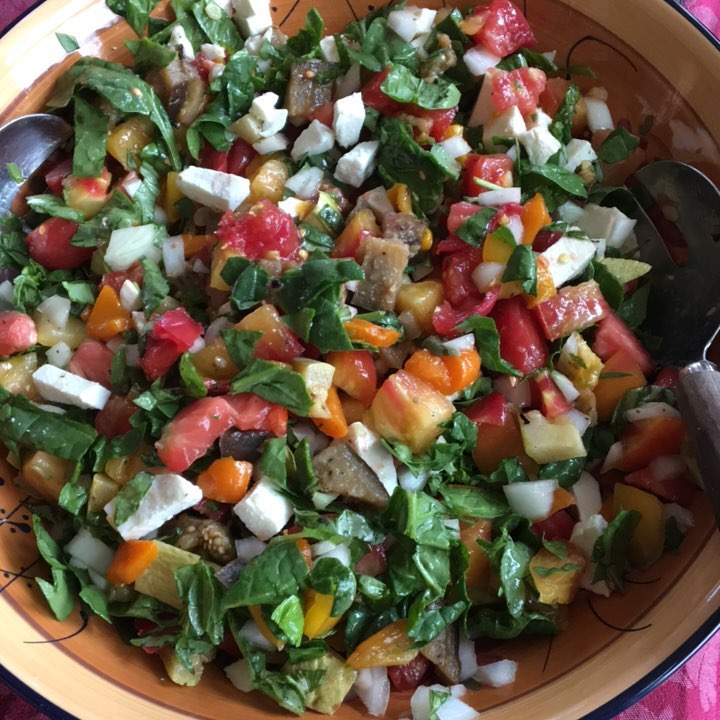
Tomato, basil, eggplant and mozzarella cheese salad
4 large tomatoes
1/4 eggplant
1 yellow and 1 green summer squash
1/2 red and 1/2 yellow bell pepper
1/2 sweet onion
1 cup basil
2 cups spinach
8 oz mozzarella cheese
kalamata olives (optional)
1/2 cup bean sprouts (optional)
Dressing
1/2 cup olive oil
1/4 cup balsamic vinegar
1 teaspoon mustard
Cut eggplant and squash into 1/4 slices, coat with olive oil and garlic salt ( I also like to sprinkle the squash with Penzeys salsa and pico mix) and broil on both sides until cooked. Allow to cool Place bell peppers under the broiler skin up and cook until skin is blackened. Place in a paper bag for half an hour. Peel off skin.
Cut eggplant, squash, tomatoes and mozzarella cheese into 1/4 squares and peppers into thin strips. Place in a large salad bowl. Dice the onion, shred basil and spinach. Add these to the mix. Add kalamata olives and bean sprouts if desired and mix well just before serving.
Mix oil, vinegar and mustard together. Add to salad or serve separately.
I served the salad with Parmesan Garlic bread, Olive tapenade and pesto and it was delicious.
What Is Your Response?
Let’s have some fun. Watch the video below and think about the food that you enjoy.
Are there flavours that you love to savour at this season of the year whether it be the autumn abundance of the Northern hemisphere or the first fruits of spring in the Southern? Sit and think about those flavours and the recipes that enhance them and allow you to appreciate them to the full. Perhaps you could set aside some time to make your favourite recipe as an offering of praise and thanksgiving to God.
Imagine God enjoying these flavours with you. Recite Psalm 34:8 Taste and see that the Lord is good several times. What comes to your mind? Is there a way that God might ask you to respond.
At 08:30 on the morning of September the 11th 2001 I was nervously getting ready for day two of my new job at the headquarters of American Airlines in Texas. I was over for a time from the UK to take up my position as a personality profiler and was anxious to do well in my new role, so was dressed early and caught the first shuttle to the HQ building whereupon I sat at my desk in a briefing room and awaited my colleagues who were due in at nine-ish.
At 08:50 a security guard burst into the room and shouted at me to follow him. I knew this was no drill by the look in his face, his posture and the urgency in his voice, you can’t mimic that kind of response. So I followed him down the hall, it was then I heard the first screams…
Much later in the day as a vast number of us gathered in the training facility lecture room watching live feeds of the unfolding events, we had instinctively gathered into small groups and dotted ourselves around. Some were silently sitting together, some were crying, hugging and many were praying. Praying for the people dying in the buildings, the colleagues and passengers we knew on the planes, and praying that there would be no more attacks to happen that day.
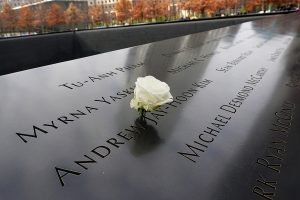 Being one of three people from the UK in the building at that moment I myself felt very alone and in quite a state of fear and shock. My selfish mind took over and all I could think of was getting back home to my wife and two year old son, everyone else was at the back of my mind. It’s a feeling I still remember with some bitterness that in that moment my usual compassionate nature flew out of the window to be replaced with self-preservation and getting home.
Being one of three people from the UK in the building at that moment I myself felt very alone and in quite a state of fear and shock. My selfish mind took over and all I could think of was getting back home to my wife and two year old son, everyone else was at the back of my mind. It’s a feeling I still remember with some bitterness that in that moment my usual compassionate nature flew out of the window to be replaced with self-preservation and getting home.
Many hours later when we were allowed to leave, I sat in the hotel restaurant listening to people angrily demanding war and retribution, vengeance and more death. I later chatted to a man in the hotel who wanted immediate nuclear strikes at the middle east, I questioned him “where”? He replied “Anywhere”. This vile act of hatred had spread its poison and had begat reciprocal hatred amid horror, death and confusion.
Such is the response of grief and anger, a swell of feelings that range from despair to hatred in a single moment and we can all fall into this, none of us can escape such feelings, we are hard-wired to experience them. It’s how we cope with them that is the key. I found that my feelings were best handed to God, that my anger was laid at the foot of cross as I swapped it for a mantle of compassion and prayer, James 1:19-20 “Know this, my beloved brothers: let every person be quick to hear, slow to speak, slow to anger; for the anger of man does not produce the righteousness of God”. (ESV)
I spoke earlier that I had felt selfish and ashamed with my thoughts and prayers of “just get me home”, well God gave me the opportunity to redeem myself, not in his eyes but in mine. On the plane home, the first out of Texas once the flight ban had lifted, I was sat next to a young lady who was terrified of the flight. I was still in semi-official capacity on the plane and I spent the next seven hours consoling her, reassuring her and being a prayerful support in her time of need, and I think I needed that as much as she did.
Where was God in all this? It’s easy for us to point the finger at Him when horrible things happen. I grew up in London in the 70’s where you would hear IRA car bombs going off not far from where I lived, you would go to school and worry whether you would get blown up on the way. Where is God in all that? Did he fly the planes into the buildings? Did he set the bombs in London? No.
God did not create evil or evil doers Gen 1:31 “And God saw everything that he had made, and behold, it was very good.” (ESV), he created all that is good in the world with love but he also gave us choice and free will. We can choose to accept his love and act accordingly or to reject love. In Romans 8:28 God tells us that He works for the good of those who love Him, which for me shows that God was there with us alright. He was working through the rescue teams, the fire fighters and police, the compassionate, the strong and the ordinary. Good works came from them, comforting, rebuilding, trusting and prayer. People were brought together despite the vile acts meant to separate us, but Romans 8:38-39 “For I am sure that neither death nor life, nor angels nor rulers, nor things present nor things to come, nor powers, nor height nor depth, nor anything else in all creation, will be able to separate us from the love of God in Christ Jesus our Lord”. (ESV)
So where was God in this? He was there and he is at work Rev 21:5 “Behold, I am making all things new.” Also he said, “Write this down, for these words are trustworthy and true.” (ESV). We are still a work in progress and while we call on God to ask where is he when horrible things happen he says he is coming when the time is right and Rev 21:4 “He will wipe away every tear from their eyes, and death shall be no more, neither shall there be mourning, nor crying, nor pain anymore, for the former things have passed away.” (ESV)
At the site of the World Trade Centre now stands a memorial to all who died there, including their names carved thereon. I have not been back to America since that terrible day but I would like to return and visit the memorial to pay my respects to those there. The memorial is a fitting thing as these events and the people involved should never be forgotten.
I myself could have been a name on that memorial for I was due to be in the World Trade Centre on that morning. I was due to meet my brother there, who lives and works in Kentucky, as we had not seen each other for some years, but for a few reasons we put off the meet-up. I thank God regularly for that.
Prayer: Almighty God. You have promised us that in this world we shall see trouble, suffering and strife, but we thank you that you are there to help us through it and to see the future promise of your kingdom. “Blessed are the peace makers” are your words and so we pray for those who work and strive for peace and love, unity and protection. We pray the hardest prayer of all that you commanded “to love our enemies and pray for them” (Matt 5:44) in order to let love overcome hate. Amen
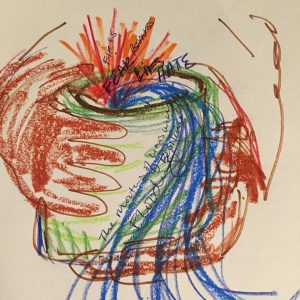
This week, our part of the world is experiencing another major hurricane that has devastated parts of the Caribbean and is on it’s way to Florida. My friends on the West Coast of the US are experiencing massive forest fires caused by the extreme heat of the summer. And last night a major earthquake hit the coast of Mexico! When you add all of this to political unrest, bombings and terrorism, IT IS A LOT! And thanks to social media and 24 hour news, we get all of this thrown at us ALL THE TIME! We need to be reminded that God is not far off, God is still here and in the midst of this with us.
The image above is what I drew in response to the one of our journaling prompts at thinplaceNASHVILLE Sunday Night. The original journaling prompt was:
It’s been another stressful news week, the terrible flooding in Southern Texas and Louisiana, and even in Nashville. And then there is the news from N. Korea…
Take some time and process this with Jesus.
Allow Jesus to carry this for you.
The image below is one of my favorites created by my friend artist Scott Erickson.
Look at the two images. Take some time to ponder and consider them.
Invite Jesus to speak to you through these images.
Am I allowing Jesus to hold all of the stuff? Or am I trying to control or fix it? or am I just being overwhelmed by it all? Talk to Jesus about where you are and how you are feeling.
Allow Jesus to CARRY the stuff and the craziness for you!
Allow Jesus to HOLD the stress, and the fear, the hatred and the anxiety.
Draw your own image, or find one in a magazine or on line that will help you remember that God is holding all things together.
Lord God we are overwhelmed by the devastation and the abundance of suffering.
Help us to Love Anyway.
We are living in uncertain times that we cannot control.
Help us to trust you and remember that you are in charge not us!
Help us to seek you Anyway.
Help us to let go and let you carry our fear and our anxiety.
In the midst of it all, help us to Love Anyway.
Help us to serve anyway.
Help us to start small and and start with love!
One day at a time. One moment at a time. In your name! AMEN
(Prayer inspired by Mother Teresa’s quote)
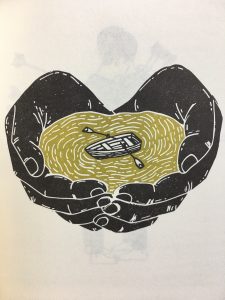
Today’s prayer by Thomas A Kempis is another that I like to repost as I contemplate my journey towards the love of God. Then watch the video below and take time to reflect on Thomas A Kempis words on love. What does the love of God mean for you and the way you live your life?
As an Amazon Associate, I receive a small amount for purchases made through appropriate links.
Thank you for supporting Godspace in this way.
When referencing or quoting Godspace Light, please be sure to include the Author (Christine Sine unless otherwise noted), the Title of the article or resource, the Source link where appropriate, and ©Godspacelight.com. Thank you!

